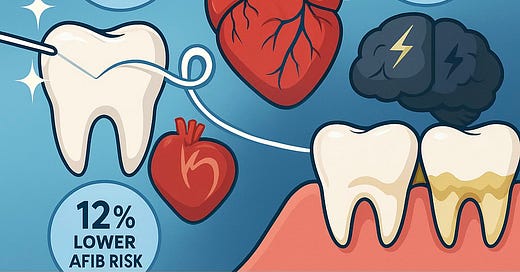From Gums to Grey Matter: Flossing's Potential Role in Stroke Prevention
New research highlights the link between dental flossing and reduced risk of stroke and atrial fibrillation
Author's note: It is important to note that this research is an abstract; it has not been peer-reviewed or published in a peer-reviewed journal. This information is strictly preliminary until the whole manuscript is peer-reviewed and published in a scientific journal.
People who regularly floss their teeth may lower their risk of stroke caused by a blood clot, as well as stroke associated with an irregular heartbeat such as atrial fibrillation (AFib), according to a preliminary study being presented at the American Stroke Association's International Stroke Conference 2025.1
The Details
The Atherosclerosis Risk in Communities (ARIC) study is one of the first large-scale investigations conducted in the U.S. The study aimed to determine which oral hygiene practice, dental flossing, brushing, or dental visits significantly impacted stroke prevention. The study assessed over 6,000 people via questionnaire to determine their oral hygiene habits.1
In addition to questions regarding dental flossing habits, participants were also asked about their status regarding hypertension, diabetes, high cholesterol, smoking, body mass index, education, brushing habits, and dental visits.1
The study has followed participants since 1987, and it is ongoing today. Of the over 6,000 participants, 82% were white, and 18% were Black adults. The average age of participants was 62 years, with a slightly higher number being female (55%) than male (45%).1
Potential participants were excluded if they had total tooth loss, dental implants, heart disease, organ transplant, artificial joints, implanted heart valve, cardiac stent, or had a history of major surgery.1
What the study found
During the 25-year follow-up, 434 participants experienced a stroke. Of those, 147 were larger artery brain clots, 97 were heart-driven clots, and 95 were hardening of the smaller arteries. In addition, 1,291 participants experienced AfFib.1
Flossing was associated with a. 22% lower risk of ischemic stroke, a 44% lower risk of cardiometabolic stroke, and a 12% lower risk of AFib. This was independent of regular brushing, routine dental visits, or other oral hygiene practices.1
The most surprising finding was the reduction in AFib. AFib can lead to stroke, heart failure, and/or other cardiovascular complications.1 More than 12 million Americans are projected to have AFib by 2030. AFib-related strokes are associated with worse clinical outcomes and higher mortality when compared to non-AFib strokes. Therefore, this finding is quite significant.2
Clinical and Oral Health Relevance
Though this is a preliminary study, the findings may contribute to a cost-effective measure to reduce stroke risk- dental flossing.1
The study's limitations include that the data was based on self-reported habits and the 25-year follow-up focused on stroke and cardiovascular outcomes alone. There was no follow-up to determine changes in flossing habits or other oral hygiene behaviors over the years.1
Previous research indicates that oral health behaviors are linked to inflammation and hardening of the arteries, both risk factors for stroke. Flossing may reduce oral infections and inflammation while also encouraging other healthy habits.1
Daniel T. Lackland, Dr.P.H., FAHA, American Heart Association EPI and Stroke Council member and professor of epidemiology and director of the Division of Translational Neurosciences and Population Studies in the Department of Neurology at the Medical University of South Carolina in Charleston commented on the study stating, "This study offers more insights into the specific dental health behaviors that may be linked to stroke risks and potential risk reduction. With further research, dental health practices could be incorporated into the "Life's Essential 8" risk factors, which include diet, physical activity, nicotine exposure, sleep, body mass index, blood pressure, blood glucose, and blood lipids." 1
In Closing
I want to provide a little of my professional opinion on this information. As a dental professional, I am not married to dental flossing. I advise my patients to "clean between their teeth." That can look different for everyone. There are options besides dental floss that can be utilized. I genuinely do not care how you clean between your teeth as long as you do.
Dental flossing is very technique-specific; if it isn't done correctly, you might as well not do it at all. This causes frustration for patients and clinicians. Patients often try to adhere to daily flossing, yet their technique may not be optimal, which makes it appear as if the patient hasn't been flossing. This frustrates clinicians because they can't understand why the patient seems flippant about their oral health. This can be a vicious cycle.
If you are a dental professional and you have a patient who claims to be flossing, yet their oral health does not reflect that, instead of assuming they are lying, consider that they may not be flossing effectively. In which case, an alternative may be a great option. We have interdental brushes, floss picks, water flossers, and more. Instead of staying married to traditional flossing, consider other options that might be more effective for the patient. The goal is not to make people floss but to improve their oral health. If traditional flossing fails them, then it is time to consider other options.
If you are a patient struggling with traditional flossing, please discuss different options with your dental hygienist or dentist. There is no shame in not enjoying flossing. Don't feel guilty because you skipped it if you hate it. Instead, try something different. The goal is improved oral health, which will also improve overall health. So, when your dental hygienist or dentist says you need to "floss" more, change the word to "clean between your teeth." It doesn't matter how you do it, as long as you do.
Reference
1. Regular dental flossing may lower risk of stroke from blood clots, irregular heartbeats. (2025, January 30). American Stroke Association International Stroke Conference 2025 - Abstract 19. https://newsroom.heart.org/news/regular-dental-flossing-may-lower-risk-of-stroke-from-blood-clots-irregular-heartbeats
2. Elsheikh S, Hill A, Irving G, Lip GYH, Abdul-Rahim AH. Atrial fibrillation and stroke: State-of-the-art and future directions. Curr Probl Cardiol. 2024;49(1 Pt C):102181. doi:10.1016/j.cpcardiol.2023.102181. https://pubmed.ncbi.nlm.nih.gov/37913929/



